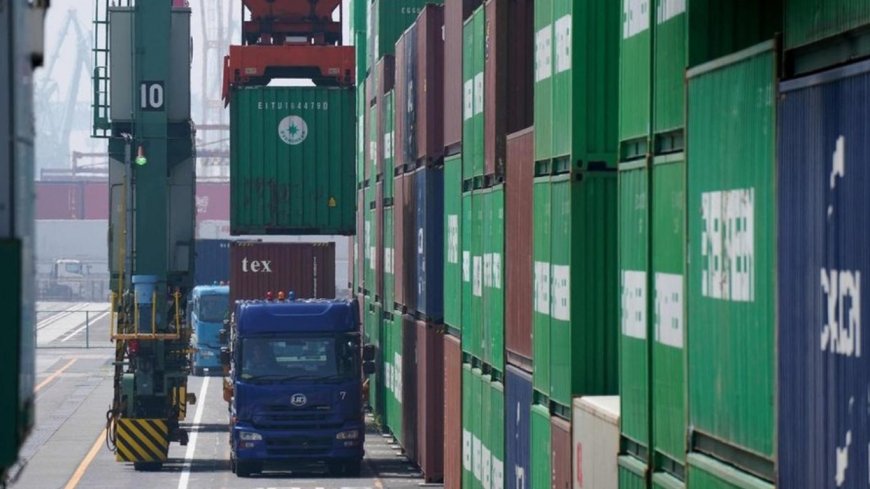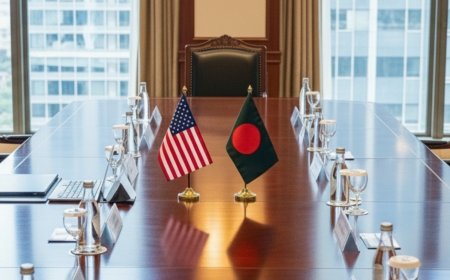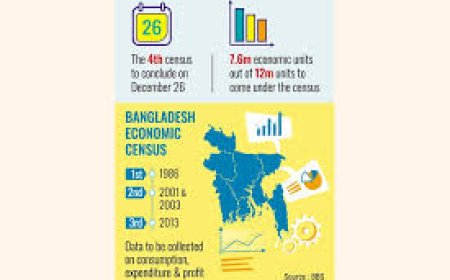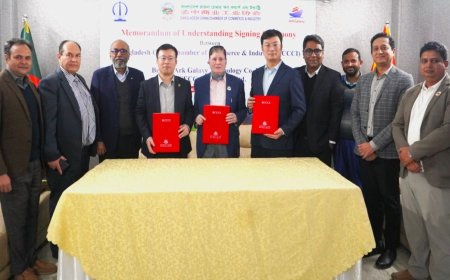Bangladeshi businesses ramp up efforts to increase imports from the US
The US tariff reduction follows coordinated lobbying efforts and purchasing commitments from both Bangladesh's public and private sectors.

Trump Administration Slashes Tariffs on Bangladeshi Exports Following Joint Public-Private Push
The Trump administration has reduced retaliatory tariffs on Bangladeshi exports from 35% to 20%, following a coordinated effort by both the Bangladeshi government and the private sector.
The announcement was made Thursday at the White House, following formal negotiations between a Bangladeshi government delegation and the Office of the United States Trade Representative (USTR) in Washington.
Alongside official talks, a team of Bangladeshi business leaders held a series of strategic meetings with American exporters in a bid to address the trade imbalance between the two nations.
The decision to ease tariffs is seen as a direct outcome of joint lobbying efforts and import commitments from both the public and private sectors of Bangladesh, according to a report by Prothom Alo.
Notable members of the business delegation included Mostafa Kamal, chairman of Meghna Group of Industries (MGI); Amirul Haque, president of the LPG Operators Association of Bangladesh; Shawkat Aziz Russell, president of the Bangladesh Textile Mills Association (BTMA); and representatives from Salma Group, among others.
Sources said the Ministry of Commerce had been engaged in lengthy tariff talks with the USTR for several months, but early discussions had made little headway.
The turning point came when Commerce Adviser Sheikh Bashir Uddin assumed responsibility for the process ahead of the second round of negotiations in July. Business leaders had long pushed for greater involvement of economic stakeholders, and this inclusion finally materialized during the final phase of discussions.
Responding to the government's call, the private sector delegation reached out to major US agricultural exporters in the final week of July. In just two days of meetings, they secured import agreements worth $268 million for soybean seeds and cotton.
They also made broader pledges to boost overall imports from the United States, as reported by Prothom Alo.
According to business insiders, about 400,000 tons of soybean seeds were swiftly contracted for import. MGI Chairman Mostafa Kamal alone committed to importing 300,000 tons worth $130 million, while Amirul Haque of Delta Agro Food Industries signed a $100 million deal for soybeans.
Soybean seeds are essential raw materials for Bangladesh’s edible oil and animal feed industries.
Speaking from Washington, Mostafa Kamal stated, “Thanks to competitive pricing, we quickly signed an MoU with a US supplier for soybean seeds. We’ve also committed to importing corn, LPG, and wheat. This initiative is designed to reduce the trade gap and encourage further tariff relief from the US.”
Data from the National Board of Revenue (NBR) shows Bangladesh imported around $2.5 billion worth of goods from the US in the 2023–24 fiscal year. Scrap metal, soybean seeds, cotton, and LPG alone accounted for $1.5 billion — about 60% of total imports from the US.
Business leaders believe there is considerable room for expansion. While national imports of these four products totaled $7.4 billion last year, only 20% were sourced from the United States.
In the textile sector, three Bangladeshi firms signed agreements to import 19,000 tons of cotton worth $38 million. Salma Group inked a $12 million deal with Cargill Inc. for 6,000 tons, while Asia Composite and Mosharraf Group signed similar deals, including a $14 million contract with the US-based Louis Dreyfus Group for 7,000 tons.
BTMA President Shawkat Aziz Russell said, “We’ve pledged to import up to $1 billion worth of US cotton. Additionally, we’ve urged the US to provide export incentives for Bangladeshi garments made with American cotton — a move that could strengthen trade ties and benefit both economies.”
Mosharraf Hossain, managing director of Mosharraf Composite Textile Mills, said the cotton shipments covered by the current MoUs will arrive over the next six months. “We’ve also asked the government for low-interest loans to support this initiative,” he noted.
Speaking from Washington, Amirul Haque of the LPG Operators Association said, “We’ve signed multiple MoUs with US suppliers. If these commitments are fulfilled, Bangladesh could reduce the US trade deficit by up to 75% within a year.”
However, he emphasized the need for domestic policy support: “To scale up imports further, the government must ease port-related bottlenecks and consider imposing duties on soybean meal.”
What's Your Reaction?





















































































